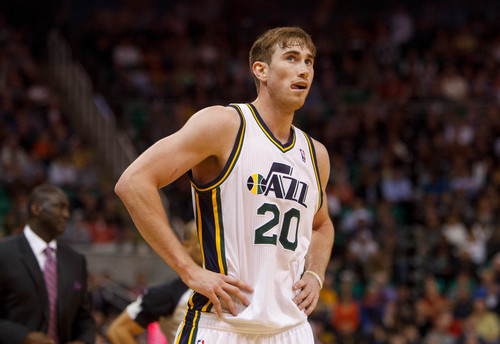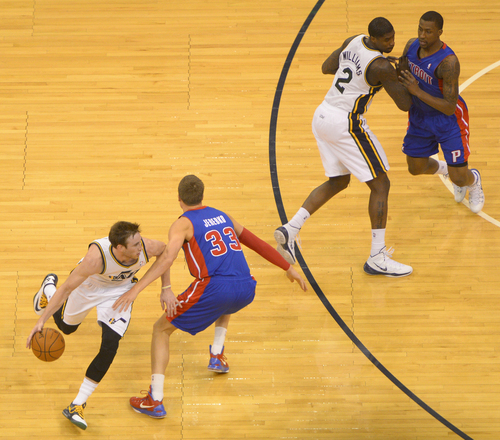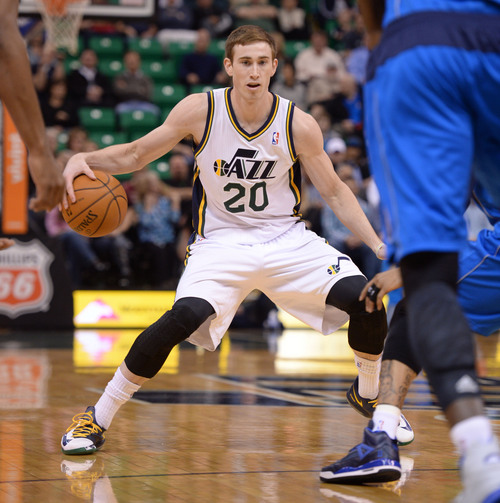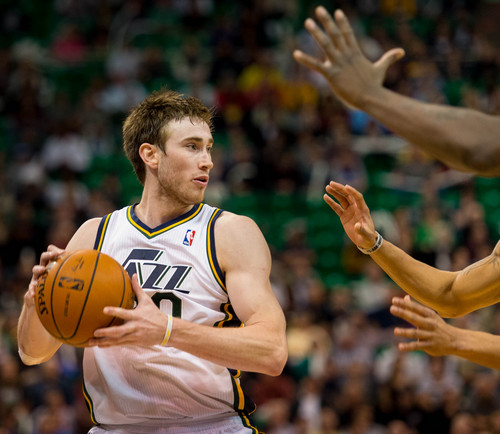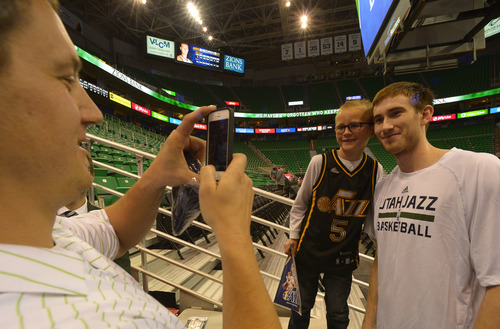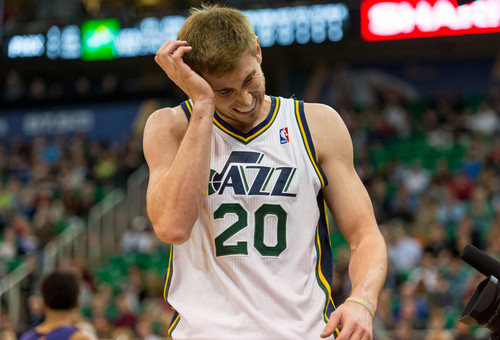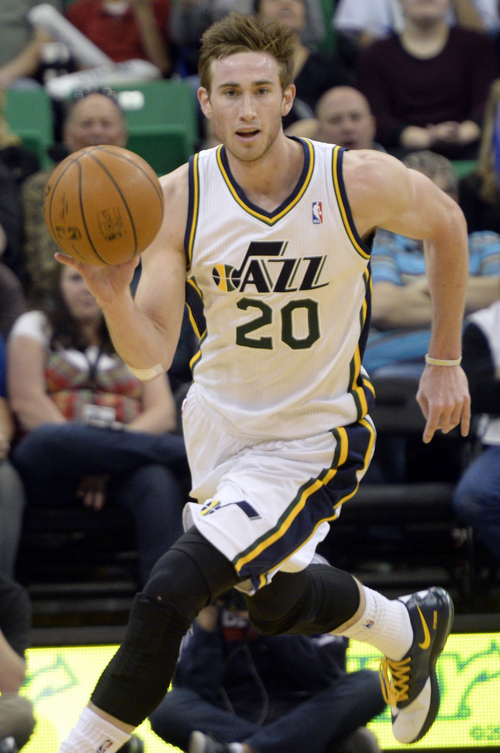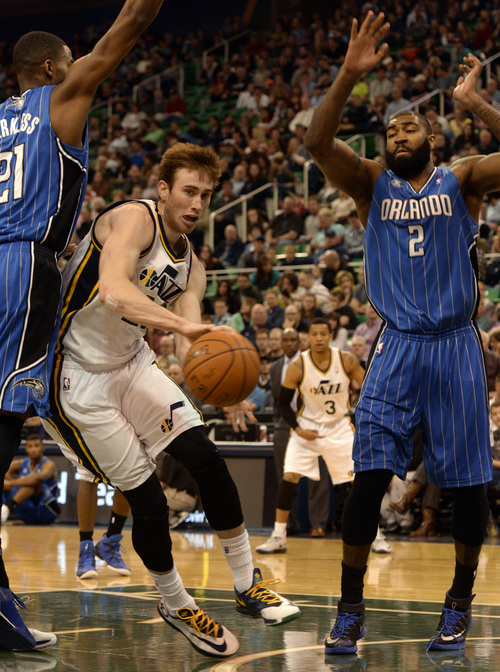This is an archived article that was published on sltrib.com in 2014, and information in the article may be outdated. It is provided only for personal research purposes and may not be reprinted.
The main entrance to EnergySolutions Arena is flanked by images of Enes Kanter and Derrick Favors on the left and Trey Burke and Alec Burks on the right. In the middle, standing guard over the building's doors, is Gordon Hayward.
He is the Utah Jazz's leading scorer, one of the young team's new captains, the face of the franchise. He is also the only one of those five players without a contract beyond this season.
In a 2013-14 campaign filled with disappointment, the 24-year-old says he's pushed his summertime uncertainty to the back of his mind. But summer is coming.
"I think we all realize how close it is," Hayward says. "And that's something we're trying to keep out of our minds. We're just trying to take it game by game. We all have a lot to prove. We have a lot of improving to do. We can't look to the summer yet, but we realize how close it is."
In July, the Jazz will reopen negotiations with Hayward's agent, Mark Bartelstein, hoping to reach the agreement that eluded them last fall. And one way or another, Hayward and the Jazz will begin a new chapter.
There have been too many losses and missed jump shots. Hayward will be the first to admit that.
And the swingman from Butler, unaccustomed to both, has worn his displeasure on his sleeve at times.
"We've had a tough season and you see it on his face and his emotions," his friend and teammate Jeremy Evans said.
Before the season, Hayward was unceremoniously tasked with leading the rebuilding Jazz. But as the year opened, Hayward watched as the Jazz reached a four-year deal with his co-captain, Derrick Favors, while the Jazz declined to match Hayward's asking price, letting him become a restricted free agent in July.
What's followed has been a season of ups and downs.
The Jazz are 23-50 with nine games left to play in the season, and Hayward's field-goal and 3-point percentages are at career-low levels.
A new contract won't improve a jump shot, but his teammates know it will be a weight off his shoulders once it's done.
"That's with everybody," Evans said. "He's focusing on playing right now, but that's still back there above his head sometimes. You don't know what's going to happen. When he's done with that, he can relax and just play."
Said Jazz coach Ty Corbin, "It's huge for anybody. Young player, old player, anybody in this league. It's your livelihood."
As much as anything, this season for Hayward has been about establishing himself.
It's been a difficult task at times. He no longer has Al Jefferson in the post, demanding double teams, or Paul Millsap there to take a big shot.
Hayward's usage is up and his efficiency is down.
Still, as the season winds to a close, Hayward believes he has what it takes to be a No. 1 option — a job Corbin says requires "almost an arrogance" — going forward.
"You definitely have to have a swag," Hayward said. "You have to play with confidence. You have to know that you're one of the best guys on the court and play like it too. … It's something that I embrace. It's a challenge, but it's something that I'm excited about."
He's shown flashes of it this season:
• He leads the Jazz in scoring, averaging 16 points a game. He's second in assists (5.2) and third in rebounds (5.3)
• Twice he's fallen an assist shy of a triple-double.
• On Jan. 7, he scored the Jazz's final 17 points to beat the Oklahoma City Thunder.
"I think he can [be a team's top player]," ex-Jazz forward Paul Millsap said. "It's up to Gordon. It's up to Gordon what he do with it. For him, he's a quiet guy. He's a facilitator. He's a playmaker. It all depends on how he feels about it and how he approaches it."
Another ex-teammate, DeMarre Carroll, called Hayward "phenomenal," but provided a different perspective on one of Utah's most indispensable players.
"If he can get on a team where he's not the first option, he's the second option or third option, he'd probably be an All-Star," Carroll said.
One thing that is certain for Hayward: he's about to get a raise.
The only question: How much?
As the ninth overall pick in the 2010 draft, Hayward will be paid $3.4 million for his work this season, the last of his rookie deal. And when free agency opens in July, it seems certain Hayward will have his share of suitors if he cannot reach a deal with the Jazz.
If he does end up signing an offer sheet with another team, Utah will have the opportunity — and funds — to match any offer if it sees fit.
Hayward's agent has made it clear that he was not seeking a max deal for his client last fall, though how much the Jazz might be willing to pay for Hayward's services remains unknown.
Barring an exorbitant offer from elsewhere, however, the Jazz are poised to match.
"He's someone we can see in a Utah Jazz jersey until he retires," general manager Dennis Lindsey said in October. "That's our hope. We think there's a great fit."
As the offseason approaches, Hayward is starting to pad his resume. He's knocking down more shots (47 percent overall and 35 percent from 3 in March) and he's getting to the free-throw line more often.
What it will mean in terms of dollars is still unclear.
"You can't worry about that until the summer," Hayward said. "As of right now I'm just playing basketball."
The rest will follow. —
Gordon Hayward, by the numbers
Season Games Minutes Points Rebounds Assists FG% 3FG%
2010-11 72 16.9 5.4 1.9 1.1 48.5 47.3
2011-12 66 30.5 11.8 2.6 3.1 45.6 34.6
2012-13 72 29.2 14.1 3.1 3 43.5 41.5
2013-14 68 36.3 16.0 5.2 5.2 41.5 31.3 —
Jazz at Thunder
Sunday, 1 p.m.
TV: ROOT Sports


